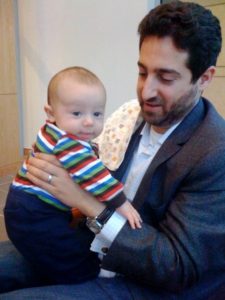Some people love to hear stories; others love to tell them. In search of new material, storytellers may place themselves into somewhat far-fetched and jarring adventures – hoping the stress, discomfort and inconvenience will yield and eventually fade to an intriguing tale, a rapt audience and a sense of satisfaction at having made it through.
Could that be why I agreed to move from western New York to eastern Connecticut two weeks after our wedding, one week after our honeymoon, a mere 14 months after Josh and I had gone on our first date?

Near the start of our whirlwind courtship, Josh decided he wanted to leave his law firm for a career in academia, and began applying to doctorate programs across the East Coast. As we raced through moving in together and planning our dream wedding, I fancied myself the muse who jolted creative men’s souls from corporate purgatory and gave them wings to aspire. That those wings were taking us six hours from our close-knit families and comfortable lifestyle didn’t bother me. It seemed fitting to start a new chapter with a new zip code, a new last name, and a new purpose: supporting my husband through his Ph.D. studies at Yale University.
Our 400-mile relocation ranked a 7/15 on the Gupte Scale. I had few qualms about our destination, but I was worried about shouldering the unfamiliar burden of financially and emotionally supporting my spouse — especially given that we hadn’t actually known each other all that long. (On our honeymoon cruise, we were still cramming for the Newlywed Game by frantically telling each other our favorite condiment, color, teacher, etc.)
On the first official day of our New Haven life, the moving van pulled up to our new apartment and a shirtless, tattooed man with missing teeth hopped out of the passenger seat. He explained that the van driver, lost and driving in circles, had picked him up for directions. This passenger was now, inexplicably, also in charge of moving our precious cargo. After he hauled the last box to our doorstep, he looked over his shoulder and said: “Be careful. This is a rough neighborhood.” So much for not worrying about our destination!
“I want to move,” I said to my new spouse. But Josh pointed out that other graduate students were living there, too; how bad could it be? Gritting my teeth, I decided to approach each challenge as potential material for my future stand-up routine: the creepy moving man, the elevator door that weighed 70 pounds, the mysterious gunk that frequently filled up the washing machines, the corner supermarket in which women got into fistfights over 89-cent tilapia. Hilarious!
Flailing, Not Trailing
The comedy continued as I discovered that simultaneously changing my name and state of residence had placed me in a bureaucratic no man’s land. Getting a new Social Security card before I got my Connecticut driver’s license? No problem. Having to show my new driver’s license to apply for my new Social Security card? Uh-oh. Untangling this bizarre knot took hours and stacks of paperwork; when the DMV employee finally called, “Melissa Pheterson? Melissa Pheterson!” I almost didn’t respond, until my mother (who had driven six hours to help out) elbowed me and said, “That’s you!”
Perhaps I hadn’t eased into my new identity. Perhaps I had skidded onto the trail too soon. Perhaps I wasn’t trailing; I was flailing. Still, I remained hopeful. I clung to my mental slideshow of our idyllic life: Josh would read history books and debate politics with his classmates in coffeehouses; I would find an intellectually stimulating job on campus — maybe as a museum curator or a gallery docent? — where I could drink in the culture and bond with other academic wives.
Reality soon set in, as three months passed with no luck. Determined to begin earning something to supplement Josh’s academic stipend while waiting for my resume to land on a friendly desk, I began participating in the psychiatry department’s paid experiments. (One involved spending three hours in an MRI machine and viewing photos of severed fingers and the barrel of a gun. Hey, someone has to show scientists exactly which regions of the brain react to unpleasant images!) I also began scraping together some income through freelance writing assignments:
- Calculating how many jumping-jacks burn off the calories in Stouffer’s Frozen Dinners, movie popcorn and Nestlé Crunch bars
- Reminding women it was easy to diet
- Reminding women never to diet
- Interviewing Kim Cattrall about “I Can’t Believe It’s Not Butter”
- Interviewing people who had seen a ghost
Most of Josh’s classmates turned out to either be single or have partners who were busy with their own degree programs or full-time jobs. Through the international student center, I instead made friends with trailing spouses who were learning an entirely new country and culture — not just a new surname and set of streets. We met up for “intercambios,” or language exchanges: I would practice my Spanish for 30 minutes, then help them with their English.
“It’s illegal to wear white after Labor Day?” asked one Argentinian, after I remarked that it was the last day I could wear my skirt until May. “Not illegal, but the fashion police might get you!” I joked. Then she looked even more alarmed, and I struggled to correct the confusion I had caused. Couldn’t I do anything right?
Next to the expats, my homesickness and disorientation felt petty and trivial, difficult to justify. Most of them couldn’t work due to visa issues; I couldn’t work, it seemed, due to lack of marketable skills. The campus position I finally found was technical and difficult; it involved a mastery of Mail Merge far beyond what I could comprehend, and my predecessor — the only one qualified to train me — had escaped to a better job and refused to set foot into her old office. Within weeks, my boss gently but firmly let me go.
I holed up in our apartment all winter. Josh kept me company during the day, then met up with his new friends at night to discuss the Federalist Papers (before “Hamilton” made them famous).
Eventually, I found a somewhat steady gig off-campus: SAT tutoring suburban high schoolers at their lavish homes, as a contractor for a small firm that had no scruples about embellishing my credentials. The teenage boys always cheerfully went along with my selective selection of problems that I didn’t necessarily know how to solve; the girls were seldom fooled, but after a terrifying hour, they reflexively slipped me the check their parents had written. Sometimes, I spotted their impeccable stay-at-home mothers calmly tending to their siblings; their fathers were always at work. And each time I pulled out of their circular driveways to head back to our depressing apartment, my gut wrenched with my realization that my husband had forsaken corporate America, but I hadn’t actually forsaken my expensive tastes and need for security.
What had seemed like a romantic adventure as a newlywed now seemed alarming.
What I Really Wanted
I began to rebel inwardly, perhaps seeking to regain control, by refusing to eat any more than the bare minimum. I didn’t need to lose any weight, yet I lost 20 pounds. My disordered eating left me skeletal and weak, but I tapped into some primal fury to exercise vigorously and continue working as much as possible. I told myself I was following a budget and avoiding frivolous excess. But when my parents came to visit and burst into tears, I agreed to see a counselor who instructed me to eat high-fat foods 15 times a day. I obeyed — and after I had regained enough weight, I found out I was going to have a baby.

Nine months later, our son’s birth confirmed what part of me had known all along: I didn’t want adventure, uncertainty, late-night philosophy and odd jobs. I didn’t want material for a future in stand-up comedy. I wanted my family. I wanted sleep. I wanted utter mundanity and cliché: the spacious suburban house with a backyard, the corporate husband, the grandmother who pops in to check on the baby and throw in some laundry into our own machine that didn’t spew gunk.
When I finally begged Josh to return to corporate life, he capitulated — too tired, as a new parent, to argue — and we pivoted 180 degrees. This was the most dramatic “intercambio” of all: a complete exchange of our roles. Instead of trailing behind, I was now confidently calling the shots. Our future would be built upon my fierce new maternal instincts, rather than vague romantic visions.
Has it panned out?
Ten years later, we now have two children and two full-time jobs. I didn’t get to be a stay-at-home mom in a fancy mansion, and Josh didn’t get to be an absentminded professor. Had I known him better or known myself better during those newlywed years, perhaps I would have continued to trail him: bringing my baby to work, trusting in our long-term happiness, eventually settling into college towns like my international friends have done. The grass is always greener.
But if the trail cut sharply beneath our tentative first steps, perhaps it also help cement our family bond. It took leaps of faith and trust to carry us through our engagement, marriage, moving away and moving back home. Every step showed that we are ultimately each willing to sacrifice, to fall in step behind the other, with growing confidence that one day we’ll get the timing right and see our sacrifices pay off. Until then, I’ll remember the initial courage I summoned in meeting new people, forging friendships in a foreign language, even staying in that MRI machine as bloody severed limbs flashed before my eyes. Over those two and a half years, I gained much more than Spanish fluency, SAT math skills, and stand-up comedy material — I gained the confidence to understand and articulate what I really want and need to get through the toughest stretches of marriage and motherhood. That mettle still carries me through moments of anxiety and uncertainty today.

